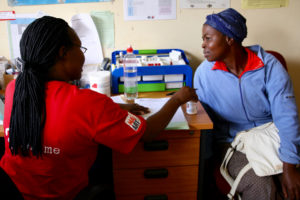The HIV/AIDS community received good news ahead of the 2017 International AIDS Society (IAS) meeting in Paris: for the first time ever, more than 50 percent of people living with HIV were receiving antiretroviral therapy (ART) at the end of 2016 and AIDS-related deaths have halved since 2005. If this trend continues, the world will be on track to meet the UNAIDS Fast-Track targets of 30 million people receiving ART by 2020 – an ambitious, but now attainable, goal.
A clear understanding of the complex, ever-changing antiretroviral (ARV) market in low- and middle-income countries (LMICs) is critical for all stakeholders in the HIV space. To this end, CHAI has been publishing an annual ARV market report for public consumption that is based on aggregated market intelligence from our programmatic work in over 30 countries. We are pleased to release the 8th issue of this report, ARV Market Report: The State of the Antiretroviral Market in Low- and Middle-Income Countries (2016 – 2021).

CHAI’s HIV Access Program’s mission is to ensure rapid access to the best health products at affordable and sustainable prices for patients in resource-limited settings. CHAI supports partner governments in scaling up the HIV response by working toward high-quality and cost-effective ART for people living with HIV/AIDS and HIV prevention among high-risk populations. On the supply side, CHAI aims to maintain a reliable and transparent marketplace for ARV drugs for innovator and generic drug manufacturers to ensure a sustainable supply of life-saving medicines for patients. As a result, CHAI’s coordinated engagement with both the supply and demand sides of the ARV and diagnostics markets helps improve market efficiencies, which in turn help reduce prices.
Key highlights from this year’s ARV Market Report include:
• Of the nearly 37 million people living with HIV/AIDS worldwide, 53 percent were on ART in 2016. For the first time ever, more than 50 percent of those living with HIV/AIDS are on ART (approximately 19.5 million adults and children).
• Multiple LMICs are nearing control of their HIV epidemics. Swaziland, Lesotho, Malawi, Zambia, and Zimbabwe have all made remarkable progress toward controlling their respective epidemics and meeting the UNAIDS 90-90-90 targets which state, by 2020, that 90 percent of people living with HIV will know their status, 90 percent of those diagnosed will be receiving ART, and 90 percent of those receiving ART will be virally suppressed.
• New optimal ARVs have received stringent regulatory authority approvals for use in LMICs. Two generic fixed-dose combinations of TDF/3TC/DTG (TLD) have received tentative approval from the U.S. Food and Drug Administration (FDA), with the first orders expected to arrive in countries in Q1 2018. Furthermore, additional suppliers are now available for optimal pediatric formulations, such as ABC/3TC 120/60mg
• Prices for key first-line adult regimens continue to decrease with a landmark pricing deal for TLD. As treatment prices decrease, resources are available to be spent scaling up treatment for more patients and/or investing in prevention technologies. Notably, generic TLD will launch at an average price of $75 per patient per year, which is significantly less than the average price paid for adult first-line patients in 2016. This represents the first time a new, more optimal regimen can be introduced at a lower price than the prevailing treatment.
• The pediatric ARV market continues to consolidate around optimal World Health Organization-preferred regimens. Collaborations between partner organizations, such as the Global Accelerator for Pediatric Formulations (GAP-f), aim to catalyze and promote the development and commercialization of novel, optimal pediatric formulations.
• Prevention efforts continue to scale-up, including the use of oral pre-exposure prophylaxis (PrEP). At least ten LMICs have adopted oral PrEP in their national treatment guidelines, and South Africa has reported over 2,300 individuals initiated on oral PrEP as of July 2017.
Despite all of these successes, much work remains to be done to end the AIDS epidemic as a public health threat. With the generous support from Unitaid, the UK Department for International Development (DFID), and the Bill & Melinda Gates Foundation, CHAI is focused on meeting this goal by working with Ministries of Health, suppliers, and partners to ensure that all patients have access to the best drugs at affordable and sustainable prices, no matter where they live.
If you have any questions on the ARV market or would like to learn more about the space, please contact Vineet Prabhu – Senior Manager, Market Intelligence, HIV Access at CHAI.





